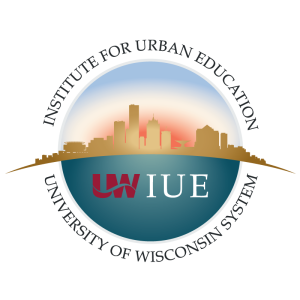
OTT1818
Overview
Each part includes a 1-hour video that features thoughtful discussions between parents, educators, and researchers about equitable education practices. Also included are facilitators’ guides, slide presentations, reading lists, reflective questions, and interactive activities.
Educational Focus
This 3-part series encourages discussion and critical thinking about how disparities and bias impact classroom practice.
Key Benefits
- Provides structure to open conversations around race and bias in education
- Authentic voices from education stakeholders
- Online accessibility allows remote participation
- Complete at your own pace, in a group, or individually
- Prepared materials for easy facilitation
- Facilitate yourself or with IUE facilitation
- Optional live and remote facilitators
- Perfect for professional development at the beginning of the school year

The mission of the Institute for Urban Education (IUE) is to prepare highly effective, culturally knowledgeable teachers who can serve the needs of culturally diverse youth in PK-12 schools.
Program Breakdown
Part 1: Disparities in Special Education
Explore perspectives on bias and the over-identification of Emotional-Behavior Disorders for African-American boys.
Research has found that white children in Wisconsin public schools are more likely to be diagnosed with high-status disabilities like ADHD, while children of color are more often diagnosed with low-status disabilities like behavior disorders, which have a strong association with the juvenile justice system. In Part 1 of the series, you will explore perspectives on bias and the over-identification of Emotional-Behavior Disorders for African American boys.
Part 2: Disparities in School Discipline
Discuss how Zero Tolerance Policies enacted in response to school shootings have had a negative effect on Black and Brown students.
Teacher responses to misbehavior may be attributable to racial perceptions and bias. Teachers as a group are more likely to deem students’ behavior harmful or indicative of a harmful pattern when those students are Black. Similarly, misconduct from Black students is punished more harshly than the same misconduct from white students. One study found that 26% of Black students received at least one suspension for a minor infraction over the course of three years, compared with just 2% of white students. In this series installment, you will discuss how Zero Tolerance Policies enacted in response to school shootings have had a negative effect on Black and Brown students.
Part 3: Literacy and Social Justice
Literacy rates have been consistently lower for Black and Brown students in Wisconsin. Discuss how literacy for all students is a social justice issue.
Nationally, literacy rates have been consistently lower for Black and Brown students. In 2019, The Nation’s Report Card found that just 15% of Black 8th graders were at or above reading proficiency. About half didn’t even reach the basic reading benchmark. Wisconsin, specifically, has one of the widest achievement gaps between African American and white students on fourth- and eighth-grade math and reading tests in the nation. The gap in graduation rates is the largest in the nation with white student rates at 92.9% and African American students at 66.1%. In Part 3, the discussion focuses on how literacy for all students is a social justice issue.
Intellectual Property
Copyrighted work
Inventor
Lisa Litzsey, Interim Director, UWM Institute for Urban Education
Educator Testimonial
“The learning opportunities conducted by the Institute of Urban Education were not only insightful and thought provoking, but it gave a face to some of the issues that we so often have detached from student, family, and community members. Hearing a parent share their personal struggles in trying to provide her child with an equitable learning experience really made the issues real and put participants in a space of reflection which led to purposeful conversation and actions. Participants left the space with the insight, resources and empowerment to change their personal practice and school communities.”
Francisco Sanchez, Community Schools K-5 Manager
Please contact the UWMRF Team to share your business’ needs and learn more.
